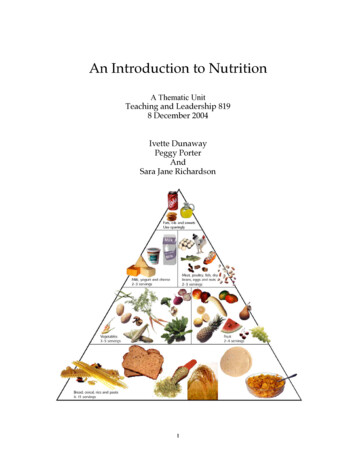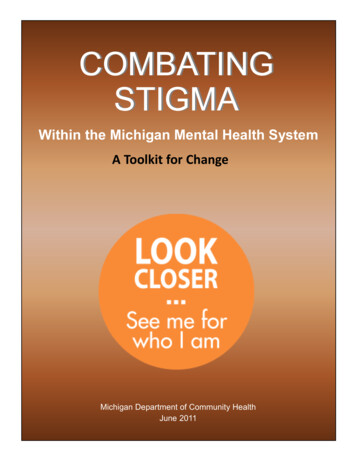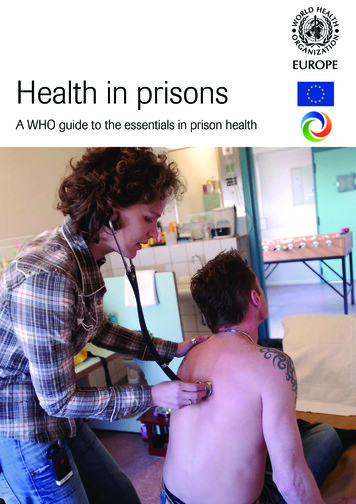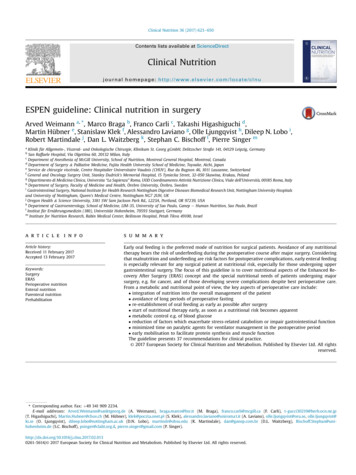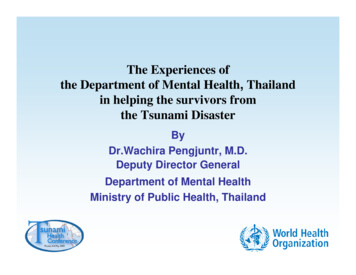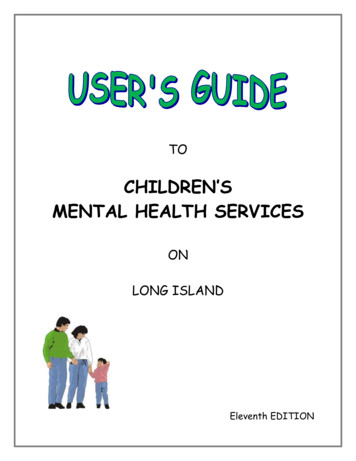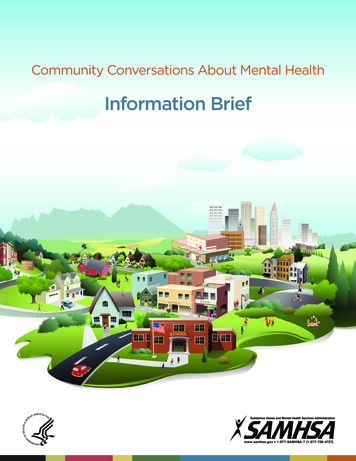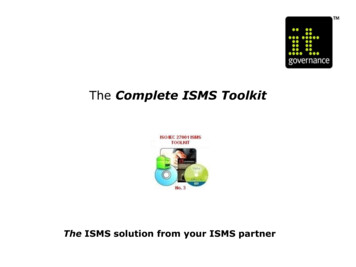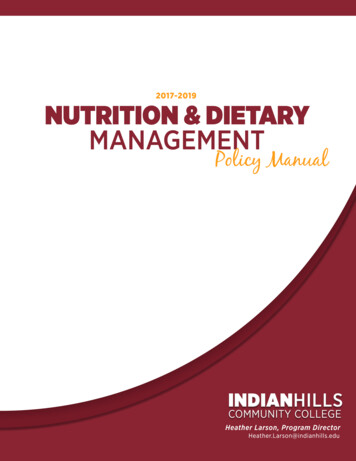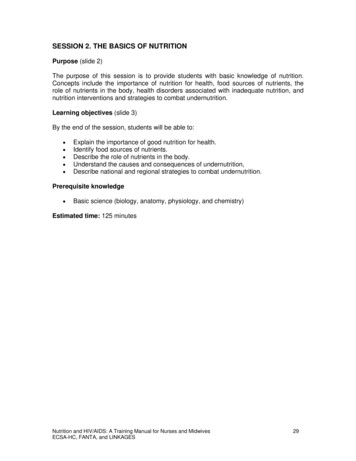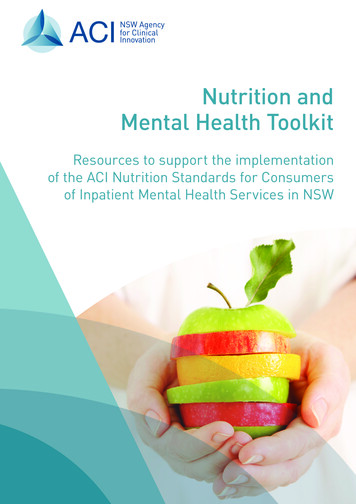
Transcription
Nutrition andMental Health ToolkitResources to support the implementationof the ACI Nutrition Standards for Consumersof Inpatient Mental Health Services in NSW
AGENCY FOR CLINICAL INNOVATIONLevel 4, Sage Building67 Albert AvenueChatswood NSW 2067Agency for Clinical InnovationPO Box 699Chatswood NSW 2057T 61 2 9464 4666 F 61 2 9464 4728E info@aci.nsw.gov.au www.aci.health.nsw.gov.auProduced by:ACI Nutrition NetworkPh. 61 2 9464 4666SHPN: (ACI) 150075ISBN: 978-1-76000-146-9Further copies of this publication can be obtained from:Agency for Clinical Innovation website at: www.aci.health.nsw.gov.auDisclaimer: Content within this publication was accurate at thetime of publication.This work is copyright. It may be reproduced in whole or part for studyor training purposes subject to the inclusion of an acknowledgmentof the source.It may not be reproduced for commercial usage or sale. Reproduction forpurposes other than those indicated above, requires written permission fromthe Agency for Clinical Innovation. Agency for Clinical Innovation 2015Published March 2015
ACKNOWLEDGEMENTSThe Agency for Clinical Innovation’s (ACI) Nutrition Network commissioned Kate Fletcher, ConsultantDietitian, to prepare this toolkit. Members of the ACI Nutrition and Mental Health Working Groupprovided guidance and comments on drafts of the toolkit.Members of the ACI Nutrition and Mental Health Working Group involved in this project:Jan Plain Senior Dietitian, Macquarie Hospital, Northern Sydney Local Health District (Co-Chair)Meg Vickery Senior Dietitian, Bloomfield Hospital, Western NSW Local Health District (Co-Chair)Belinda Lee Senior Dietitian, Bloomfield Hospital, Western NSW Local Health DistrictBrad Roser Clinical Nurse Consultant, The Forensic Hospital, Justice and Forensic Mental Health NetworkCorinne Cox Senior Food Service Dietitian, HealthShare NSWCraig Locke Team Leader, Mission AustraliaElayne Mitchell Team Leader, Official Visitors Program (OVP)Gladys Hitchen Senior Dietitian, Cumberland Hospital, Western Sydney Local Health DistrictKate Fletcher Dietitian, Hunter New England Mater Mental Health, Hunter New England Local Health DistrictKatrina Davis Advisor, NSW Mental Health CommissionLauren Reece Dietitian, St George Hospital, South Eastern Sydney Local Health DistrictLimor Weingarten Clinical Nurse Educator, Macquarie Hospital, Northern Sydney Local Health DistrictPeri O’Shea Chief Executive, NSW Consumer Advisory Group (CAG), Mental HealthRegina McDonald Area Clinical Nurse Consultant, Specialist Mental Health Services for Older People, SouthWestern Sydney Local Health District, and Braeside Hospital Hammond CareSharon Mak Dietitian, Hornsby Hospital, Northern Sydney Local Health DistrictSuzanne Kennewell Director, Nutrition and Dietetics, Sydney Local Health DistrictTanya Hazlewood Nutrition Network Manager, Agency for Clinical InnovationThe following people also contributed to the development of the toolkit by sharing existing toolsand resources:Claire Ward Food Service Dietitian, Western NSW Local Health DistrictCorinne Cox Senior Food Service Dietitian, HealthShare NSWGladys Hitchen Senior Dietitian, Cumberland Hospital, Western Sydney Local Health DistrictHelen Jackson Profession Director, Nutrition and Dietetics, Hunter New England Local Health DistrictJan Plain Senior Dietitian, Macquarie Hospital, Northern Sydney Local Health DistrictKate Fletcher Dietitian, Hunter New England Mater Mental Health, Hunter New England Local Health DistrictACI Nutrition and Mental Health Toolkit iii
Kelly Dart Nurse Manager Policy, Practice and Initiatives, Nursing and Midwifery Directorate, Far West LocalHealth DistrictLillian ForrestNutrition Project Manager (FSIP), HealthShare NSWMeg VickerySenior Dietitian, Bloomfield Hospital, Western NSW Local Health DistrictNatalie AlborésSpeech Pathologist, Macquarie Hospital, Northern Sydney Local Health DistrictSharon MakDietitian, Hornsby Hospital, Northern Sydney Local Health DistrictTracey PatricksHead Dietitian Coffs Harbour Health Campus, Mid North Coast Local Health DistrictTraci Cook Manager Dietetics, Nepean and Blue Mountains Hospitals, Nepean Blue Mountains LocalHealth DistrictThe ACI Nutrition Network acknowledges and thanks the following for their valuable feedback on theconsultation draft:Carol Smith Nurse Unit Manager, Hilltop Lodge T-BASIS Unit, Hunter New England Local Health DistrictCraig Millington Appointment Liaison Nurse, Hunter New England Mater Mental Health, Hunter New England LocalHealth DistrictHelen Jackson Profession Director, Nutrition and Dietetics, Hunter New England Local Health District and Co-Chairof Nutrition in Hospitals Committee, ACIMaria RobertsDietitian, Intermediate Stay Mental Health Unit, Hunter New England Local Health DistrictSuzanne Johnston Clinical Nurse Consultant, Psychiatric Rehabilitation Service, Hunter New England Local HealthDistrictSamantha Krupp Clinical and Food Service Dietitian, St Vincent’s Private Hospital, St Vincent’s Health NetworkACI Patient Experience and Consumer Engagement (PEACE) TeamACI Nutrition and Mental Health Toolkit iv
ABOUT THE ACIThe Agency for Clinical Innovation (ACI) works with clinicians, consumers and managers to design and promote betterhealthcare for NSW. It does this by: Service redesign and evaluation – applying redesign methodology to assist healthcare providers and consumers toreview and improve the quality, effectiveness and efficiency of services. Specialist advice on healthcare innovation – advising on the development, evaluation and adoption of healthcareinnovations from optimal use through to disinvestment. Initiatives including Guidelines and Models of Care – developing a range of evidence-based healthcareimprovement initiatives to benefit the NSW health system. Implementation support – working with ACI Networks, consumers and healthcare providers to assist delivery ofhealthcare innovations into practice across metropolitan and rural NSW. Knowledge sharing – partnering with healthcare providers to support collaboration, learning capability andknowledge sharing on healthcare innovation and improvement. Continuous capability building – working with healthcare providers to build capability in redesign, projectmanagement and change management through the Centre for Healthcare RedesignACI Clinical Networks, Taskforces and Institutes provide a unique forum for people to collaborate across clinicalspecialties and regional and service boundaries to develop successful healthcare innovations.A priority for the ACI is identifying unwarranted variation in clinical practice and working in partnership with healthcareproviders to develop mechanisms to improve clinical practice and patient care.ACI Nutrition and Mental Health Toolkit v
TABLE OF CONTENTSPURPOSE. 1BACKGROUND. 2TOOLKIT OVERVIEW. 4Development Process.4Structure.4PART 1: NUTRITION STANDARDS IMPLEMENTATION CHECKLIST. 5Overview.5PART 2: NUTRITION CARE GOVERNANCE AND LEADERSHIP. 6LHD / Network Level Governance Committee Responsibilities.6Facility Level Nutrition Care Governance Committee Responsibilities.6Consumer / Carer Roles.7Meeting Nutrition Care Policy and Accreditation Requirements.7Other Key Nutrition Care Governance Reference Material.7PART 3: NUTRITION STANDARDS – EDUCATION AND INFORMATION. 8Staff Education.8Information for Staff, Consumers and Carers.8PART 4: MENU DEVELOPMENT. 9Menu Review Key Stakeholders Role and Responsibilities.9Site or LHD / Network Information for Menu Development - Nutrition Care and Food Service Data Checklist.9Nutrient Checklist.9Minimum Menu Choice Checklists.9Banding Ready Reckoner.9Menu Examples.10Other Key Menu Reference Material.10REFERENCES.11APPENDICES. 12Appendix 1: Nutrition Standards Implementation Checklist. 12Appendix 2: NSW Health LHD / Network Nutrition Care Committee Agenda Template.20Appendix 3: NSW Health LHD / Network Nutrition Care Committee Terms of Reference Template.21Appendix 4: NSW Health Facility Nutrition Care Committee Agenda Template.25.Appendix 5: NSW Facility Nutrition Care Committee Terms of Reference Template.26Appendix 6: Nutrition Care Committees - Engaging Consumers / Carers.29Appendix 7: NSW Health Nutrition Care Policy: Mapping to Accreditation Requirements.30Appendix 8: The Menu Review Process - Roles of Key Stakeholders.49Appendix 9: Site or LHD/Network Information for Menu Development - Nutrition Care and FoodService Data Checklist. 51.Appendix 10: Nutrient and Minimum Menu Choice Checklists and Banding Ready Reckoner.55 .Appendix 11: Example Menus.58ACI Nutrition and Mental Health Toolkit vi
PURPOSEThe purpose of the toolkit is to provide guidance, tools andresources to support the:1.) Implementation of the Nutrition Standards forConsumers of Inpatient Mental Health Servicesin NSW1 across Local Health Districts (LHDs) andSpecialty Health Networks (Networks); andNutrition StandardsFOR CONSUMERS OFINPATIENT MENTAL HEALTHSERVICES IN NSW2.) Development of governance structures andleadership for implementing the NSW HealthNutrition Care Policy directive (PD2011 78).2The toolkit will assist LHDs / Networks and/or facilities inboth developing and implementing an action plan to meetthe requirements of the Nutrition Standards and NutritionCare Policy. It may assist in developing food servicepartnership level agreements.In addition, a resource has been included that may assistLHDs / Networks and/or facilities determine areas forimprovement in terms of meeting the following nationalaccreditation mandatory and desirable standards: National Safety and Quality Health Service Standards(NSQHS) - The Australian Commission on Safety,Quality in Health Care (ACSQHC)3 National Standards for Mental Health Services(NSMHS) - Commonwealth of Australia4 Evaluation and Quality Improvement Program(EQuIP) additional standards - The Australia Councilon HealthCare Standards (ACHS).5Policy DirectiveMinistry of Health, NSW73 Miller Street North Sydney NSW 2060Locked Mail Bag 961 North Sydney NSW 2059Telephone (02) 9391 9000 Fax (02) 9391 ceNutrition CarespaceDocument Number PD2011 078Publication date 16-Dec-2011Functional Sub group Corporate Administration - GovernanceClinical/ Patient Services - Governance and Service DeliverySummary This document describes the NSW Health framework for nutrition careand support to be implemented by Local Health Districts and other NSWpublic health organisations.Author Branch Office of the Chief Health OfficerBranch contact Office of the Chief Health Officer 9391 9463Applies to Local Health Districts, Board Governed Statutory Health Corporations,Specialty Network Governed Statutory Health Corporations, AffiliatedHealth Organisations, Public Health System Support Division, PublicHospitalsAudience Administrative all staff, clinical, medical, allied health, nursing, dietitiansDistributed to Public Health System, Health Associations Unions, NSW AmbulanceService, Ministry of Health, Private Hospitals and Day Procedure Centres,Tertiary Education InstitutesReview date 16-Dec-2016Policy Manual Patient MattersFile No. H11/100385Status ActiveDirector-GeneralspaceThis Policy Directive may be varied, withdrawn or replaced at any time. Compliance with this directive is mandatoryfor NSW Health and is a condition of subsidy for public health organisations.ACI Nutrition and Mental Health Toolkit 1
BACKGROUNDThe NSW Health Nutrition Care Policy directive(PD2011 78)2 released in December 2011 sets out the“NSW Health framework for a strategic and coordinatedapproach to nutrition care and support from admission totransfer of care”, and includes patient menu selection.2The implementation of the Nutrition Care Policy andits related standards in NSW Local Health Districts andother NSW public health organisations was to occur byDecember 2013.2The Policy states that “menus should provide thenutritional requirements of patients in accordance withthe following” related ACI documents: Nutrition Standards for Adult Inpatients inNSW Hospitals6 Nutrition Standards for Paediatric Inpatients inNSW Hospitals7 Therapeutic Diet Specifications for Adult Inpatients8 Therapeutic Diet Specifications forPaediatric Inpatients9The ACI Nutrition Standards for Consumers of InpatientMental Health Services in NSW1 (“the NutritionStandards”) were launched in October 2013 by theMinister for Mental Health. The Nutrition Standardsare “appropriate for most adults and older adolescentsin mental health facilities, including those who areoverweight/obese or nutritionally at-risk, due to over-orunder-nutrition”.1 It has been recognised that “they mayalso be relevant for people in other long-stay settingse.g. spinal injuries or brain injury”.1LHDs and Networks are encouraged to implement thesenew Nutrition Standards within two years of their release(i.e. October 2015).The Nutrition Standards form a component of the ‘foodand fluids provided’ in the ACI Patient Nutrition CareJourney10 (Figure 1 page 3) in term of meals needingto be safe, adequate and appropriate for a mentalhealth population.1 They also have links to the followingcomponents: “Policy and Governance” - by having a mentalhealth representative at each LHD / Networkand/or Facility Nutrition Care Committee, whereappropriate.1, 2, 10 “Mealtime environment, supervision andassistance, mealtime observations” - with the goalof normalising eating, supervising cutlery use;supervising meal time intake and therapeuticdiets etc.1, 2, 10 “Nutrition screening, assessment, care planningand monitoring” - in terms of malnutritionscreening and/or metabolic monitoring; assessmentby mental health dietitian as required and nutritioncare planning.1, 2, 10The Nutrition Standards aim to ensure that menus“provide the opportunity for consumers of mental healthservices across NSW to select food that satisfies theirrequirements and supports their recovery”.1 They supportthe development of menus that are based on soundevidence as well as ensuring that the food and nutritionprovision is patient-centred.1The process of implementing the Nutrition Standardsis at the discretion of the LHDs / Networks and will bebased on enhancing the current food service provisionand overall nutrition care of consumers of mental healthservices within NSW.ACI Nutrition and Mental Health Toolkit 2
ACI Nutrition and Mental Health Toolkit 3and additional considerations related to Mental Health Services in NSW (purple boxes).1, 10, 11Figure 1: The ACI Patient Nutrition Care Journey – Food and Fluid Provision element highlighted (in red)
TOOLKIT OVERVIEWDevelopment ProcessThe ACI Nutrition and Mental Health Working Groupconsidered what would be required to supportthe implementation of the Nutrition Standards forConsumers of Inpatient Mental Health Services in NSW(the “Nutrition Standards”).1 A list of potential toolsand resources was generated and then prioritised forinclusion in the toolkit.Members of the ACI Nutrition in Hospitals Committeeand ACI Nutrition and Mental Health Working Groupwere asked to share relevant existing documents andresources for consideration. The consultant prepareddraft versions of documents and tools which werereviewed by the ACI Nutrition and Mental HealthWorking Group.Draft versions of the toolkit were circulated to allmembers of the ACI Nutrition in Hospitals Committeefor comment. The final version was endorsed by the ACINutrition in Hospitals Committee and the NSW HealthCommittee in November 2014. The ACI Executive teamapproved the Toolkit for release in December 2014.StructureThe toolkit is divided into the following four parts:Part 1: N utrition Standards ImplementationChecklistPart 2: Nutrition Care Governance and LeadershipPart 3: N utrition Standards – Education andInformationPart 4: Menu DevelopmentEach part provides information and an explanation ofthe relevant tools and resources that are available asappendices.ACI Nutrition and Mental Health Toolkit 4
PART 1: NUTRITION STANDARDSIMPLEMENTATION CHECKLISTOverviewThe purpose of this supplementary checklist is to assistthe implementation of the Nutrition Standards.1 It canbe used in conjunction with the Nutrition Care PolicyImplementation Checklist.2The checklist provides the following:1. A n overview of the key elements required to meetthe Nutrition Standards2. An outline of the supporting tools and/orresources that have been included in the toolkit3. A dditional links to other useful informationand suggested tools / resources that couldbe developed.A copy of the Nutrition Standards Implementationchecklist is included as Appendix 1.Appendix 1: Nutrition Standards Implementation ChecklistThe purpose of this checklist is to guide implementation of the Nutrition Standards for Consumers of Inpatient Mental Health Services in NSW (“the Nutrition Standards”).It can be used in conjunction with the Nutrition Care Policy Implementation Checklist. It provides an overview of the key elements required to meet the NutritionStandards. It includes an outline of the supporting tools and/or resources that are available in the toolkit. It also provides additional links to other useful information andmake suggestions about tools / resources that could be developed locally.TOOLKIT PART 2: GOVERNANCE AND LEADERSHIPNutrition Care Key Elements Required to Meet thePolicy Element Nutrition StandardsTools and Resources Availablein the Toolkit1. Policy andGovernanceAppendix: 2: LHD Agenda Template 3: LHD TOR Template 4: Local / Facility AgendaTemplate 5: Local / Facility TOR Template 6: Engaging Consumer / Carer 7: Nutrition Care PolicyAccreditation Mapping 8: Menu Review Process –Roles of Key StakeholdersACI Nutrition and Mental Health Toolkit 12An LHD/ Network committee responsiblefor nutrition care and food is in place andthe terms of reference (TOR) includes: Mental Health representation Consumer and/or Carer representation Responsibility for overseeing theimplementation of the NSW HealthNutrition Care Policy Responsible for conducting a LHD/ Network review and developingan action plan for implementing theNutrition Standards for Consumers ofInpatient Mental Health Services inNSW Endorsement of a Menu Review SubSteering Committee to assist withrealignment of menus for the LHD /NetworkSuggestion Links to the NSW Health Nutrition andFood Committee and ACI NutritionNetworkSuggested Tools / Resources(that could be developed) orUseful LinksCurrent Compliance StatusNotStartedPartiallyCompletedCompletedUseful Links: Physical Health Care withinMental Health Services Policy(PD2009 007) Physical Health Care ofMental Health ConsumersGuidelines (GL2009 007) The Patient Nutrition CareJourney document The Patient Nutrition CareJourney presentation ChOICES: The Patient MenuSelection Process document ChOICES: The Patient MenuSelection Process presentationContinued on page 13ACI Nutrition and Mental Health Toolkit 5
PART 2: N UTRITION CARE GOVERNANCEAND LEADERSHIPNSW Health LHDs and Networks are responsible for theprovision of nutrition care for all inpatients and residentswithin their facilities.23.2. t he preferred food service model for thedelivery of food to meet the nutrition careneeds of their consumers within availablefunds and resourcesThe Nutrition Care Policy (PD2011 078) requireseach NSW Health LHD and Network to establishgovernance structures for nutrition care (e.g. aNutrition Care Committee).2Each facility is encouraged to have an individualisedgovernance structure for nutrition care2 either as aseparate Nutrition Care Committee or by includingnutrition care as an agenda item on an existingcommittee such as the Patient Safety and ClinicalQuality Committee.Another option is for facilities to establish a multifocused Nutrition Care and Physical Health Committeeto implement both the Nutrition Care Policy2 and thePhysical Health Care within Mental Health Services PolicyDirective (PD2009 027)12.LHD / Network LevelGovernance CommitteeResponsibilitiesResponsibilities of LHD and Network Nutrition CareCommittees could include:3.2. f ood service priorities, products andservices based on consumers’ needs andchanges of clinical care practices andrequirements within the context of ashared services framework.4.Reporting4.1. action plans4.2. implementation progress4.3. evaluation of compliance with therequirements of the Nutrition Care Policy.To help guide the initiation and/or realignment tothe recommended LHD / Networks Nutrition Caregovernance structure the following templates have beendeveloped: LHD / Network Nutrition Care Committee AgendaTemplate (see Appendix 2) LHD / Network Nutrition Care Committee Terms ofReference (TOR) Template (see Appendix 3).1. C oordinate and Oversee the implementationof the Nutrition Care Policy across their LHD /NetworkFacility Level Nutrition CareGovernance CommitteeResponsibilities2. Support / Implement2.1. g overnance structures and communicationacross the LHD / NetworkResponsibilities for facility Nutrition Care GovernanceCommittees could include:2.2. l ocal facilities to meet their accreditationrequirements in terms of nutrition care2.3. l ocal facilities to meet their responsibilities ofthe Nutrition Care Policy.3. R eview, Develop and Recommend3.1. a reas for improvement and action plansfor nutrition care across the LHD/Networkaccording to the Nutrition Care policy elements.1. O versee the implementation of the NutritionCare Policy within the site / facility2. Implement2.1. regular Nutrition Care meetings andcommunication pathways for the site /facility governance structure2.2. a ll recommendations from the LHD /Network e.g. staff training, nutritionscreening etc.ACI Nutrition and Mental Health Toolkit 6
3. Review, Develop and Recommend3.1. s ite/ facility assignments of responsibility,personnel and resources required to meet thenutrition care policy requirements3.2. c hanges to current Nutrition Care proceduresand develop site / facility based action plansfor the implementation of the NutritionCare policy3.3. b asic menu requirements for the site andmenu changes in conjunction with LHD /Network and appropriate staff e.g. Dietitian.4. Reporting4.1. implementation progress to LHD / Network4.2. site / facility accreditation progress4.3. evaluation of compliance with therequirements of the Nutrition Care Policy forsite / facility.To support the initiation and/or realignment of a FacilityNutrition Care Committee governance structure thefollowing templates have been developed: Local / Facility Nutrition Care Committee AgendaTemplate (see Appendix 4) Local / Facility Nutrition Care Committee TORTemplate (see Appendix 5).However, the Nutrition Care Policy does have links to: eight of the nine mandatory assessable NationalStandards for Mental Health Services (NSMHS) 4, 14 nine of the mandatory 10 NSQHS3 all five of the elective EQuIP standards in particularStandard 12: Provision of Care.5To provide guidance on how the Nutrition Care Policymeets the accreditation requirements for NSQHS,NSMHS and EQuIP, the toolkit contains a resourcethat maps the standards to elements in the policy andprovides examples of available and proposed evidence(see Appendix 7).Other Key Nutrition CareGovernance Reference MaterialOther key reference material related to nutrition caregovernance and leadership that has been developed andpublished by ACI include: The Patient Nutrition Care Journey document10 The Patient Nutrition Care Journey presentation11 ChOICES: The Patient Menu Selection Processdocument15 ChOICES: The Patient Menu Selection Processpresentation.16Consumer / Carer RolesIt is mutually beneficial for the organisation to engageconsumers and carers to ensure nutrition care ispatient-centred.3-5, 13A resource containing suggested roles of Consumers/ Carers within Nutrition Care Committees has beendeveloped (see Appendix 6). It provides guidance tomanagers and clinicians on engaging consumers / carersas well as supporting them to actively contribute tonutrition care discussions.Meeting Nutrition CarePolicy and AccreditationRequirementsThere is currently no mandatory national nutrition careaccreditation standard within the 10 National Safety andQuality Health Service Standards (NSQHS).3ACI Nutrition and Mental Health Toolkit 7
PART 3: NUTRITION STANDARDS –EDUCATION AND INFORMATIONIt is important there is education and informationavailable for staff and consumers / carers on theNutrition Standards.Staff EducationTo assist in staff education, a presentation aboutthe Nutrition Standards with speaker notes hasbeen developed and is available on the ACI website.The purpose of the presentation is to provide a briefoverview of the Nutrition Standards for all staff andcould be delivered by a clinician such as a Dietitian,Clinical/Nurse Educator and/or Clinical NurseConsultant (CNC).Some settings may utilise Volunteers and thepresentation may need to be tailored to meet theirinformation needs.The presentation is generic and may require additionalsite-specific information to be prepared. This couldinclude information about the staff available forimplementing the Nutrition Standards and about thefood service delivery system.There are other resources available that were developedfor the acute care setting. How they are applied inmental health settings will need to be considered at alocal level. They include: ACI Food and Nutrition in NSW Hospitals:Brochure17 ACI Food and Nutrition in NSW Hospitals:Factsheet18- Available in English and seven communitylanguages - Arabic, Chinese Simplified,Chinese Traditional, Greek, Italian, Spanishand Vietnamese HealthShare NSW Guidelines for BringingOccasional Food to Patients: Brochure19 HealthShare NSW Guidelines for BringingOccasional Food to Patients: Factsheet20- Available in English and seven communitylanguages - Arabic, Chinese Simplified,Chinese Traditional, Greek, Italian, Spanishand Vietnamese.Information for Staff,Consumers and CarersThe following ACI information resources are available: Nutrition Standards for Consumers of InpatientMental Health Services in NSW: A Guide forConsumers and Families Factsheet- Available in English and seven communitylanguages - Arabic, Chinese Simplified,Chinese Traditional, Greek, Italian, Spanish andVietnamese Introducing the Nutrition Standards for Consumersof Inpatient Mental Health Services in NSW:Factsheet (a resource for staff)ACI Nutrit
ACI Nutrition and Mental Health Toolkit iii The Agency for Clinical Innovation’s (ACI) Nutrition Network commissioned Kate Fletcher, Consultant Dietitian, to prepare this toolkit. Members of the ACI Nutrition and Mental

